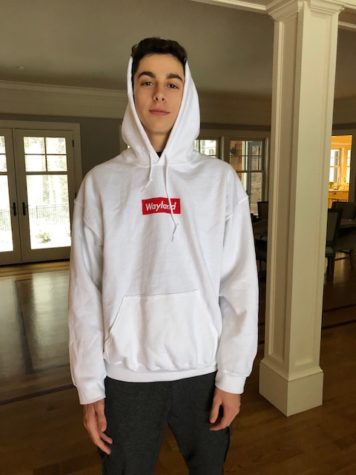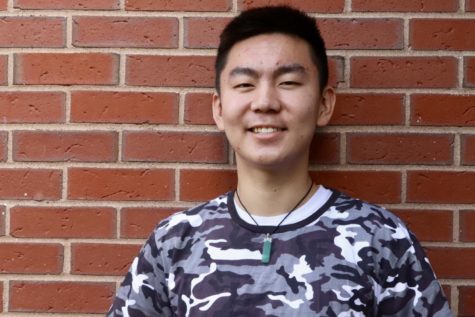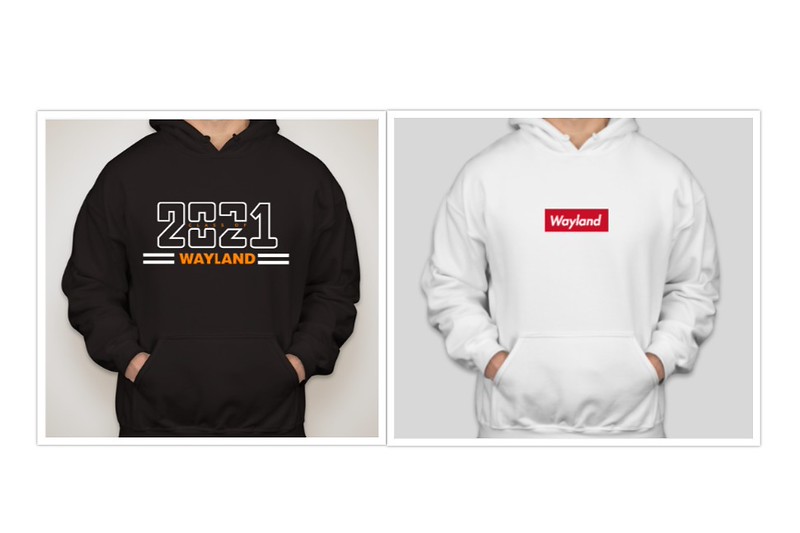Freshman Michael Long designs and sells alternative class sweatshirts
The WHS Class of 2021’s executive board recently completed its sales period for class sweatshirts, but it was not alone in this endeavor. In unprecedented fashion, freshman Michael Long designed and ordered his own brand of class sweatshirts, which he made available for purchase during a simultaneous time frame as the board’s sales period.
As of the closing bell on Tuesday, Dec. 5, the board successfully sold 124 units and reaped $1,910 in profit through their CustomInk purchasing link, with about $400 procured from donations. Yet, freshman Vice President Victoria Andreasen, Treasurer Aiden Zhang and Secretary Meredith Prince believe Long’s venture hindered their ability to attract even more customers.
“It’s really not the best thing for our class,” Prince said.
An interview with freshman President Jay Provost was avoided due to his close friendship with Long.
The officers recognize Long’s right to initiate the sale of his alternative sweatshirts, but they maintain he could have postponed his sales period so that it wouldn’t coincide with the board’s.
“I mean, he could have sold them at any other time, but the fact that he’s doing it now is disrupting our sales,” Prince said. “This isn’t a sale just for us, it’s for the whole grade, for us to have fun events. The fact that he’s doing this [is] kind of impeding on that a little bit.”
Long gathers that his initiative did not affect the board’s sales because of an inherent lack of consumer interest in the board’s selected design, which was created by freshman Elizabeth Zhong. Long’s design is modeled after the popular “Supreme” sweatshirts that are distributed by the New York City company Supreme.
“The people that are buying [my sweatshirts] told me that they wouldn’t buy the eboard’s anyway because they didn’t like the design,” Long said. “They told me that they didn’t like their design and wouldn’t have bought it even if I didn’t sell mine.”
According to Long, all profits he garners from sweatshirt sales will help fund his ~$1,700 personal cost for his church’s community service trip to Guatemala. Long’s mother suggested the idea.
“In Guatemala, we will build new houses for those who need them, paint schools to make them look better and more enjoyable for the children and also just play with children and interact with the community,” Long said.
When the board decided to undertake the class sweatshirt campaign, they first held a design contest among the entire Class of 2021 student body; after all designs were submitted, the board selected their top three and then allowed the class to ultimately decide the final design. Long did not crack the initial top three vote.
“His design just isn’t original,” Prince said. “That’s why we chose different designs to put up as our final three – because his wasn’t original and we thought it wouldn’t appeal to everyone.”
Long received support from his friends when he determined whether or not to use his design on a real product.
“I made my design for the sweatshirt contest, but I didn’t win,” Long said. “A lot of my friends said they would buy it anyway, so I decided to just make them and sell it to them.”
Once the board learned of Long’s plans, multiple people approached Long in an attempt to convince him to abandon his project.
“I texted him many times,” Prince said. “I was like, ‘Why are you doing this, you’re going to affect our sales.’ But it didn’t stop him. From the second his design didn’t win, I think he knew he wanted to sell [sweatshirts] by himself.”
Zhong, the winner of the design contest, believes Long’s enterprise curbed the board’s ability to fundraise.
“[Long is] not using his sweatshirt sales to benefit the class,” Zhong said.
Zhong said that even if she knew Long was going to generate a potential controversy, she would not have given up her design to prevent it.
“I know a lot of people would probably not want some meme design on their sweatshirt,” Zhong said. “[They] would probably want an actual design for our class sweatshirts.”
The officers do not regret holding the contest, which ostensibly lit the fire under Long.
“No, it [made the sweatshirts] more original to our class,” Andreasen said. “I don’t regret it.”
The board retailed their sweatshirts for $35 per piece, and according to Zhang, produced $10-15 margins. Long sold his for $30 and profited around $10 per sale.
Long does not view his class sweatshirts as a competitor to the board’s; rather, he sees them as an option that a certain consumer base desired.

Pictured above is freshman James Waldron wearing his sweatshirt designed by Long.
“If you think about it, they’re pretty much buying [a] sweatshirt [for] themselves,” Long said. “They could just be going to the mall and buying [my] sweatshirt.”
Long attracted 21 patrons comprised of 18 freshmen and three sophomores. One of them, freshman Sashwat Das, purchased Long’s sweatshirt but not the board’s.
“I like [Long’s] better than [the eboard’s],” Das said. “They looked cooler. They were more hypebeast and more clout.”
Das maintains that Long is not siphoning potential sales from the board. However, Das believes he would have probably bought one of the board’s sweatshirts if Long had not made his available for purchase.
Ultimately, the officers are not worried a similar situation would arise in the future.
“Some things like events [aren’t] something you can really replicate unless you pay large fees to rent places out,” Zhang said. “As for material things, I don’t really think we’re going to do that many more of those. But it still is just a small concern, and this is probably an unprecedented situation.”
“Although we are losing some money, [which is] not good, we’re not losing a ton of money,” Prince said. “It’s not a huge problem.”
Editors’ note: The original article used “clutch” instead of “clout” in Das’ quote. The article has since been corrected.
Your donation will support the student journalists of Wayland High School. Your contribution will allow us to purchase equipment, cover our annual website hosting costs and sponsor admission and traveling costs for the annual JEA journalism convention.

Kevin Wang, Class of 2020, is an editor-in-chief of WSPN, and this is his fourth year on the staff. He is captain of Wayland’s Speech & Debate team,...





![Last Wednesday, the Wayland School Committee gathered to discuss a number of topics regarding the health curriculum and Innovation Career Pathway course. Another large topic of conversation was the ways to potentially mitigate distracting cell phone usage. "These [phones] are going to distract your learning and social relationships," Superintendent David Fleishman said. "That's concrete right there."](https://waylandstudentpress.com/wp-content/uploads/2025/06/Screenshot-2025-06-04-at-9.49.31 PM-1200x886.png)



























![Troy Hoyt finishes the Boston Marathon, running for the Hoyt Foundation. T. Hoyt is the son of Hoyt Foundation CEO Russ Hoyt.
“[Running a marathon] might seem like a big thing, when it’s presented to you at first, but if you break it up and just keep telling yourself, “Yes, you can,” you can start chipping away at it. And before you know it, you’ll be running the whole 26 miles, and you won’t even think twice about it.” T. Hoyt said.](https://waylandstudentpress.com/wp-content/uploads/2025/04/C36E8761-1CBB-452E-9DF2-543EF7B1095E_1_105_c.jpeg)












































anonymous • Dec 13, 2017 at 7:03 PM
I’m glad that Michael can use his money to do some good in Guatemala. Too bad it’s at the expense of future activities for our class. Regardless of what side of the issue you’re on, the timing should’ve been different and wouldn’t have affected the sales as much. I think it would’ve been better if he gave at least some of his profits to the class.
bruh • Dec 16, 2017 at 6:47 PM
I could not agree more
boi • Dec 17, 2017 at 12:31 AM
Did you just not read the article at all… Long’s sweatshirt got nothing to do with the class, and he had been approached by classmates to purchase them. Why wait for weeks to submit in the order? That is just plain stupid. Please consider revamping your comment.
Karlis Grava • Dec 11, 2017 at 1:39 PM
This actually makes me very angry because I wasn’t able to cop a real BOGO and now these kids are rubbing it in my face
dilly dilly • Dec 11, 2017 at 8:07 AM
dilly dilly
freshman • Dec 10, 2017 at 11:21 PM
this is the most freshman thing to do. all of you should grow up.
Brains • Dec 10, 2017 at 9:46 PM
SHE TEXTED HIM ONE TIME.
anonymous frosh • Dec 11, 2017 at 7:40 AM
bruh you and i both know thats not true, and a ton of other ppl were texting him too including his close friends like josh and jay
annoymous • Dec 10, 2017 at 8:31 PM
leave
annoymous • Dec 10, 2017 at 8:31 PM
All you guys hating on the article need to calm down. This is just someone sharing their opinion. If you think that Micheal longs sweatshirt is cool, good for you go and get one. It’s not a big deal is just a sweatshirt. The class sweatshirts were an idea that our class voted on and the money goes to OUR semi next year, so obviously its going to upset those who have worked hard on these ideas. Stop the negativity.
you is right • Dec 11, 2017 at 10:01 PM
preach!!!!
hmm ik who u are • Dec 15, 2017 at 8:52 PM
u know who u are, replying to your own comment lol sus.
bruh • Dec 16, 2017 at 6:48 PM
Lol i know who said both those comments and it wasn’t the same people. Stop trying to act all cool … “sus” lol stop
ur just wrong • Dec 19, 2017 at 9:58 PM
youre just wrong tho, ik who u are. it is sus when u preach what you yourself said is it not?
Dissapointed Alum • Dec 10, 2017 at 4:03 PM
Really, a box logo hoodie ripoff?
can spell • Dec 10, 2017 at 4:54 PM
*disappointed
A Specter Is Haunting Cochituate • Dec 9, 2017 at 11:53 PM
Congratulations on figuring out capitalism, comrades.
Leif • Dec 9, 2017 at 9:54 PM
Howmst is Jay a conflict of interest and Meredith isn’t. Cmon now
not dumb • Dec 9, 2017 at 6:53 PM
Long’s design is actually so bad, why is this even a problem. The freshman class is full of idiots.
Jason Haims • Dec 9, 2017 at 7:53 PM
To “not dumb”,
The problem isn’t the design of the sweatshirt which many kids find funny and cool. (that’s why a lot were sold!)
The problem is that people are seeing it as a competitor with the class sweatshirt which it is not. Michael never tried to advertise his sweatshirt and he didn’t try to get people to buy it… they just wanted to. It wasn’t even remotely school organized it was totally private, there is nothing wrong with that.
Jason Haims • Dec 9, 2017 at 3:57 PM
I am a freshman and friends with both Meredith and Michael who seem like the two main people of this issue. When the sweatshirt design contest first started, I heard about Michaels idea and thought it was cool, clever, and funny. A lot of my friends and people I talked to really agreed and loved the idea. When his design didn’t win we were disappointed. Then when the winning design was chosen, a lot of the people that I talked to didn’t really love it and didn’t want to buy it. We still loved Michaels design and urged him to still make it which he did. It wasn’t like many of us at all were going to buy the one that the student council chose anyway so I didn’t see it as competition for the class design. I also love the charitable idea Michael had to use for the proceeds and I thought that was very nice and that it’d be cool to support that important cause.
anonymous frosh • Dec 10, 2017 at 7:32 PM
Im also a friend of michaels and merediths and I think this whole thing is so stupid. first of all, the eboard didnt choose good designs for the 3 for us to vote on, but at least we had a say in it. So in reality, we did kinda pick elizabeths sweatshirt we cant blame them because we voted for elizabeths. Although the other designs werent good. So Michael had every right to make his own sweatshirts. But I agree with Meredith when she said that he coudlve done it anytime. Ya, its good that hes doing it to his Charity thing but he coudlve done that after eboard sold it because he turned some people who said they woudlve bought the eboards if he wasnt selling them away from that. To me that is selfish to do that even though it is for a good cause. but either way both sweashirts SUCK.
Sashwat • Dec 9, 2017 at 2:15 PM
Correction: I said clout, not clutch